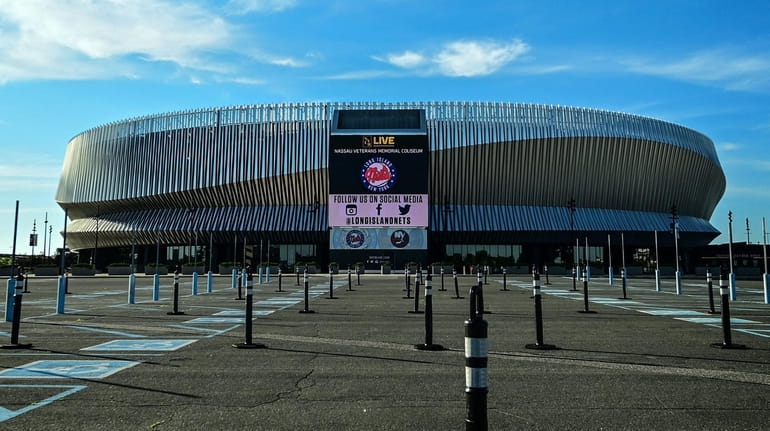Imagine a different Coliseum-Hub ending

Photo of the NYCB Live / Nassau Veterans Memorial Coliseum on the afternoon of June 16, 2020. It was announced this week that the Coliseum will be closed. Credit: Newsday/Thomas A. Ferrara
It’s hard to find a silver lining in the announcement that one of Long Island’s cultural centerpieces, the former arena for the New York Nets, and longtime home of the New York Islanders, Billy Joel, and so many more of our collective memories, is going dark.
It’s the latest blow in two decades of hard knocks, for Islanders’ fans, concertgoers, Nassau County and all who care about the region’s economic future.
Onexim Sports and Entertainment’s decision to close Nassau Veterans Memorial Coliseum indefinitely is not entirely a surprise, given the coronavirus pandemic and uncertainty around future large gatherings. Before the pandemic, the arena, with new plans for the Hub that surrounds it, had been poised to return to relevance. That’s what makes the announcement deeply disappointing.
But, as Long Islanders have for decades, we continue to hope that the Coliseum — and especially the land around it — will be part of the Island’s future resurgence, one day home to a vibrant, economic center.
Nassau Coliseum has had a tumultuous 48-year history. It’s seen incredible highs — like Dr. J taking the Nets to an ABA title, four Stanley Cup championships, sellout concerts, the 2017 reopening, and Gov. Andrew M. Cuomo’s promise of the return of the Islanders for the 2020-2021 season.
But the lows have been tough to take. We’ve mourned the departure of professional sports teams and numerous failed attempts at renovation, rebuilding, and redevelopment.
The latest chapter is even more worrisome. Onexim, the current operator of the Coliseum, has owed the county rent since February, and faces $100 million in debt on the arena. Onexim must find investors who could attempt to reopen the venue, and become partners in the longer-term effort to develop the 72 acres of asphalt that surround the Coliseum — an effort led by developer Scott Rechler, with RXR Realty.
The Coliseum remains an important symbol, especially in the short-term. The right investment team could have the opportunity to reopen it gloriously, perhaps still with Islanders hockey there before the team’s new arena opens at Belmont Park. But much remains unclear.
Development plans, meanwhile, must move forward. Long Island’s needs before COVID-19 hit — from housing to workforce development to research and medical hubs — remain. In the post-pandemic world, new development is even more critical, for the county’s troubled finances, and the region’s economic comeback.
Rechler and his team are rethinking what, exactly, will be built. A massive reimagining of the Nassau Hub is necessary. Onexim’s decision, albeit sad, provides a chance to consider a blank slate where every possibility should be on the table, from finding a way forward with the arena as is, to repurposing it as something very different, to a Nassau Hub without a Nassau Coliseum.
The Hub needs leadership, ownership, imagination, and regional thinking, along with a partnership between the state, county, town, Rechler, and future investors. But we can’t give up. A dark Coliseum with weeds sprouting in the pavement’s cracks must not be the way this story ends.
— The editorial board
